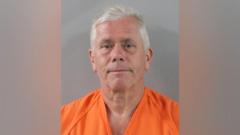Miguel Uribe, a 39-year-old Colombian senator, has died following injuries incurred during a shooting at a campaign rally. His death is a stark reminder of Colombia's fraught political landscape, drawing both local and international condemnation.
Colombian Senator Miguel Uribe Succumbs to Gunshot Injuries, Sparking Outrage and Grief

Colombian Senator Miguel Uribe Succumbs to Gunshot Injuries, Sparking Outrage and Grief
The assassination of senator and presidential hopeful Miguel Uribe, shot during a political rally, has sent shockwaves through Colombia, reviving memories of past political violence.
Colombian senator and aspiring presidential candidate Miguel Uribe has tragically passed away following severe injuries sustained from a targeted shooting just two months ago. The 39-year-old politician was shot three times—twice in the head and once in the leg—while campaigning in Bogotá on June 7, an event that deeply unsettled the nation. His wife shared the devastating news via social media, mourning the loss of "the love of my life" and recognizing him as a devoted father.
The attack has led to the arrest of a teenage suspect believed to have executed the shooting, although the motive remains unclear. Uribe’s wife, María Claudia Tarazona, expressed profound gratitude for their life together and the love they shared. After multiple surgeries following the incident, Uribe's condition deteriorated to a critical state, as stated by the hospital caring for him, which reported complications involving his central nervous system. Vigils and rallies demonstrated widespread public support for the senator as citizens gathered to pray for his recovery.
A prominent member of Colombia's right-wing Democratic Centre party, Uribe was regarded as a rising star within his political sphere, positioned to challenge the current leftist leadership ahead of the 2026 presidential elections. Just before his diagnosis, he was deemed a strong contender in the polls. President Gustavo Petro acknowledged the loss in a formal statement, offering condolences to Uribe's grieving family.
Witnesses recounted the chaos that ensued during the political event, where a 15-year-old suspect was apprehended as he attempted to flee the scene. He faces charges of attempted murder, a claim he has reportedly denied. Furthermore, law enforcement is questioning additional individuals suspected of assisting the gunman.
Uribe's assassination evokes painful memories of Colombia's turbulent eras in the late 20th century, marked by the killing of political figures. His mother, journalist Diana Turbay, was also tragically murdered after being kidnapped by narcotics traffickers in 1990.
Despite ongoing improvements in Colombia's security climate—evidenced by a significant drop in murder rates—violent acts against politicians and civil leaders remain a hazardous reality. Various armed factions are locked in bloody conflicts, further complicating the social fabric of the country.
In the aftermath of Uribe's death, political analysts suggest a potential shift toward strengthening right-leaning political narratives in Colombia. Vice-President Francia Márquez has urged the nation to reject violence, emphasizing democracy built on respect and dialogue, rather than terror. International voices like US Secretary of State Marco Rubio have echoed the call for justice in response to this shocking crime.

















